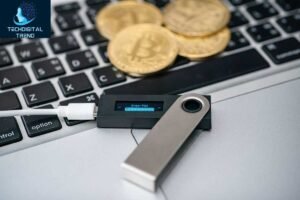Table of Contents
ToggleBitcoin Security
As the popularity of Bitcoin and other cryptocurrencies continues to grow, so does the threat of hacking and cyber attacks. In 2023 alone, over $1 billion worth of cryptocurrency was stolen due to security breaches. It’s more important than ever to prioritize Bitcoin security and protect your crypto from hackers. In this article, we’ll provide you with 10 essential Bitcoin security tips to help you do just that.
The Risks of Bitcoin Hacking
Bitcoin hacking can occur in various ways, including:
-
Phishing scams: Hackers may try to trick you into revealing your private keys or login credentials through fraudulent emails or messages.
-
Malware and viruses: Malicious software can infect your computer or phone, allowing hackers to gain access to your Bitcoin security wallet.
-
Public Wi-Fi hacking: Using public Wi-Fi networks can put your Bitcoin transactions at risk, as hackers can intercept your data.
-
Exchange hacking: Bitcoin exchanges are a prime target for hackers, who can steal your Bitcoin and other cryptocurrencies.
-
Wallet hacking: Hackers can gain access to your Bitcoin wallet by exploiting vulnerabilities or using stolen login credentials.

Essential Bitcoin Security Tips
To protect your Bitcoin from hackers, follow these 10 essential security tips:
1. Use a Reputable Bitcoin Wallet
- Your Bitcoin wallet is the first line of defense against hackers. Make sure to use a reputable and secure wallet like Coinbase, Binance, or Ledger. Avoid using wallets that are not well-known or have a history of security breaches.
2. Enable Two-Factor Authentication (2FA)
- Two-factor authentication adds an extra layer of security to your Bitcoin wallet by requiring a second form of verification, such as a code sent to your phone or a biometric scan. Because of this, hackers will have a lot tougher time accessing your account.
3. Use a Strong Password
- Use a strong and unique password for your Bitcoin wallet, and make sure to change it regularly. A strong password should include a minimum of twelve characters, consisting of a combination of capital and lowercase letters, digits, and special characters.
4. Keep Your Computer and Phone Secure
- Make sure your computer and phone are free from malware and viruses by installing anti-virus software and keeping your operating system up to date. This will help prevent hackers from gaining access to your device and stealing your Bitcoin.
5. Be Cautious of Phishing Scams
- Phishing scams are a common tactic used by hackers to gain access to your Bitcoin wallet. Be cautious of emails or messages that ask you to provide personal information or click on suspicious links.
6. Use a VPN
- A virtual private network (VPN) can help protect your Bitcoin transactions by encrypting your internet connection and making it harder for hackers to intercept your data.
7. Keep Your Bitcoin Offline
- Consider keeping your Bitcoin offline in a cold storage wallet, such as a hardware wallet or a paper wallet. This will make it much harder for hackers to gain access to your Bitcoin.
8. Monitor Your Accounts Regularly
- Regularly monitor your Bitcoin accounts for any suspicious activity, such as unexpected transactions or login attempts from unfamiliar locations.
9. Use Multi-Signature Wallets
- Multi-signature wallets require multiple signatures (private keys) to authorize transactions, making it much harder for hackers to steal your Bitcoin.
10. Stay Informed
- Stay up to date with the latest Bitcoin security news and updates to stay ahead of potential threats and vulnerabilities.

Additional Security Measures
In addition to these 10 essential security tips, consider the following additional measures to protect your Bitcoin:
-
Use a secure password manager to generate and store unique, complex passwords.
-
Enable account alerts to notify you of any suspicious activity.
-
To check your device for viruses and malware, use a reliable antivirus program.
-
Avoid using public computers or public Wi-Fi networks to access your Bitcoin wallet.
Conclusion
Protecting your Bitcoin from hackers requires a combination of common sense, best practices, and the right tools. By following these 10 essential Bitcoin security tips and additional security measures, you can significantly reduce the risk of your crypto being stolen and ensure your investment is safe. Remember, security is an ongoing process, and staying informed and vigilant is key to protecting your Bitcoin.
Open this link: Tap to here














